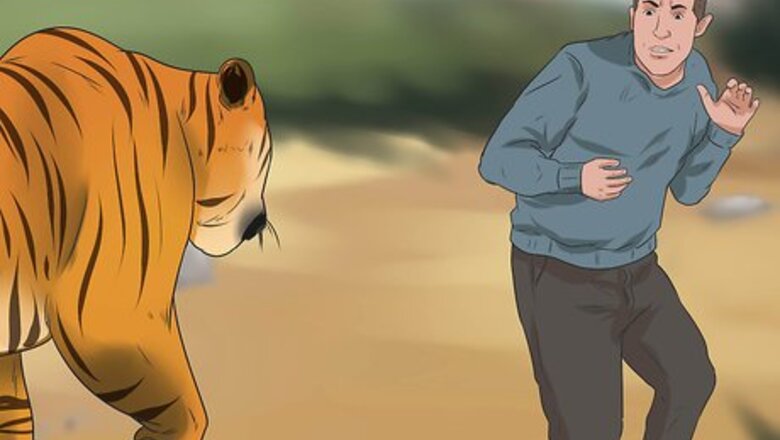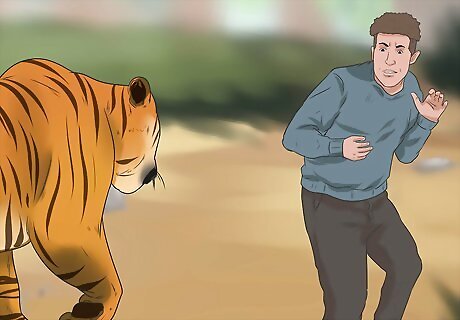
views
Surviving an Actual Tiger Attack

Try to remain calm and back away slowly. In the event that a tiger is tracking you or has begun to snarl at you and seems ready to attack, try to stay calm. Do not look the tiger in the eye, but do turn towards the tiger. Back away slowly while fighting the urge to turn your back and run. Keep walking backwards until the tiger is well out of sight, then turn and move quickly away from the location of the tiger.

Make yourself big. Try to look and feel brave. Whatever you do, do not run. Running away from a tiger is all but inviting it to attack you. Inciting a chase can literally prompt an uncertain tiger into attacking. While slowly backing away, stand up as tall as possible. Make yourself look like less of a helpless prey animal by standing up straight. Crouched down, you look weaker and smaller – both of which will increase the chances that a tiger will attack.

Repel an attacking tiger with noise. Even simple sounds may frighten a tiger off if they are not accustomed to the noise. Make noise with anything you have, especially if it makes a loud or unnatural sound. If you have a firearm, shoot it into the air. If you have a signal flare, light it and hold it in front of you. Jingle or shake any metal or glass items against one another. If you attempt to shout at the tiger, do so with full confidence. Any nervousness that is betrayed by your voice may incite the tiger to attack.

Do whatever you can to survive. If the tiger begins to physically attack, it is unlikely to stop. Continue making as much noise as possible, and use whatever you have to shield yourself and strike back in self defense. Avoid playing dead; if the tiger is attacking out of an interest in eating you, it will simply proceed unencumbered. Remember that your best chance of survival is convincing the tiger to flee, which will require you to frighten or injure the tiger. If you are lucky enough to survive an attack, work to stop any bleeding and get medical attention as quickly as possible.
Encountering a Tiger that May Attack

Avoid approaching an escaped tiger. If you see a tiger that may have escaped captivity, do not assume it is docile or friendly towards humans. Tigers that have been captive will be agitated in unfamiliar environments, and are especially likely to attack.
Attempt to distract the tiger and hide. Leave your possessions behind as you walk away, as these may momentarily distract a curious tiger. If you cannot vacate the area entirely, attempt to hide. Once you've hidden, you may attempt to distract the tiger by throwing things away from you to lead them in that direction. However, use extreme caution in doing so, as you're probably more likely to attract attention to your hiding spot. As such, it is better to throw stuff off of your path before you hide.

Do not antagonize a tiger in any way. Never antagonize a tiger or large animal of any type. Tigers, in particular, respond to aggression with aggression and will defend themselves by attacking. Do not throw anything at a tiger or attempt to hit it with something. In the event that you are attacking a tiger in order to distract it from mauling someone else, use whatever you have to strike the tiger as hard as you can. Keep shouting at the tiger, both to intimidate it and to distract it from its victim.

Give old or injured tigers a wide berth. While an old or injured tiger may seem feeble or in need of your help, they may actually be especially dangerous. Even if a tiger is in poor health, it should be treated with extreme caution. In the wild, you’re actually more likely to see a tiger in poor health, as tigers that are unable to hunt as well as they are when healthy will seek out easily accessible prey, such as livestock. This will bring them into closer proximity to humans than tigers are usually comfortable with.

Leave cubs alone. No matter how tempting it may be or how cute they may look, you should never interact with a young tiger. Tiger mothers are ferociously protective of their young and will readily come to their defense if they feel they are threatened in any way. Do not approach or attempt to interact with a cub in any way if you see one. In the wild, it is very rare to spot cubs because they are fiercely protected by their mothers. With that said, just because you see a cub all by themselves wondering around aimlessly doesn't mean that the mother isn't somewhere nearby.
Preventing a Tiger from Attacking

Travel with a guide if outdoors in tiger territory. Though there are only a few places in the world where you can see tigers in the wild, these places are sometimes open to travelers. If you’re visiting a place in which tigers freely roam, hire a guide to help ensure a safe journey. Often, organizations interested in the well-being of wild animals will provide you with information to inform you of how to behave safely in certain areas and avoid dangerous situations.

Be silent and still if you spot a tiger before it sees you. If a tiger has not noticed your presence, try to get away before it sees you. You are more likely to attract attention by moving, so simply wait until the tiger has moved on of its own accord. Once it has, move safely but deliberately towards safety, ideally in the opposite direction.

Avoid inadvertently challenging a tiger’s mark. Stated otherwise, don’t pee in a tiger’s domain. An innocent bathroom break may be interpreted by a tiger as an act of aggression, and they may perceive you as a threat if you urinate in their territory. As a general rule of thumb, always ensure that you are well hydrated and have visited the bathroom before you walk into Tiger territory.

Wear a two-faced mask. If you’re somewhere – such as the Ganges Delta in India – where people are regularly attacked and killed by tigers, consider wearing a backwards-facing mask. Rear-facing masks trick tigers, which prefer to sneak up on potential prey. By fooling the tiger into thinking you have eyes in the back of your head, you may prevent yourself from becoming its next meal. Even when tigers have been observed stalking humans, they do not attack people wearing a two-faced mask.




















Comments
0 comment